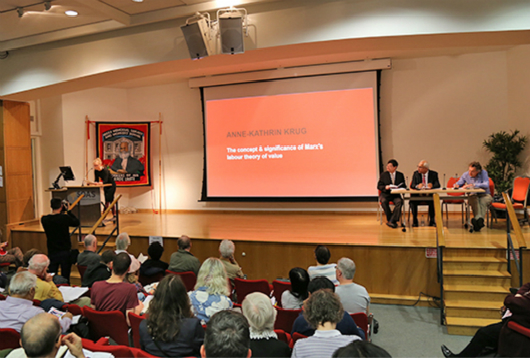
. > TOP STORIES
Advancing with the times, Marxism still relevant today
Author : Zhao Yuan Source : Chinese Social Sciences Today 2018-05-28

The conference commemorating the bicentenary of Marx’s birth organized by the Marx Memorial Library was convened at SOAS on May 5.(ZHAO YUAN/CSST)
LONDON—On May 5, a major international conference commemorating the bicentenary of Marx’s birth organized by the Marx Memorial Library was held at the School of Oriental and African Studies (SOAS), University of London. Marxist researchers from China, the United Kingdom, Germany, India, South Africa, Cuba and other countries explored the relevance and theoretical innovation of Marxism in sociology, economics, culture, arts, technology, ecology and other fields.
Founded by Marx and Engels, Marxism enables the proletariat of the world to realize their own status, needs and conditions for emancipation, laying a scientific theoretical foundation for communists to accomplish their historical mission while providing powerful ideological weapons that mankind can use to understand and change the world, said Luo Wendong, deputy editor-in-chief of the Social Sciences in China Press.
Sitaram Yechury, general secretary of the Communist Party of India (Marxist), said that Marxism is essentially the answer to the battle of ideas for humanity. Marxism is not merely the theory of capitalism’s crises, but a creative science for socialism. “Our theory is enriched by our praxis, our praxis by our theory.”
John McDonnell, the UK shadow chancellor of the exchequer, said that Marxism is still “a force for change today.” “To be considered of value, ideas have to be relevant and of interest today. Ten years after the financial crisis, interest in Marxism has not declined. It has increased.”
Ben Fine, a professor of economics at SOAS, University of London, said that Marxist theories offer deep insights into capitalism. Marxist analysis based on the social realities from mid-19th century are still providing guidance to us today. Marx’s labor theory of value is self-evident. As the core of the Marxist political economics, the labor theory of value holds the key to understanding contemporary capitalism. The complexity has amassed as capitalism evolves, which is manifested in economics, societies, technologies, media, ideologies and other areas. Marx anticipated this increasing complexity, and he pointed out how the labor theory of value could be used to disentangle that complexity. Therefore, the significance of the labor theory of value lies not only in its ability to reveal the nature of capitalist societies and other societies, but also its relevance to tackle the complex and changing societal issues, he said.
Marx and Engels predicted more than 170 years ago the inevitable emergence of global production and communication at the turn from ethnic history to world history, Luo said. Even though the founders of Marxism did not label it “globalization,” they managed to scientifically predict the global development trends based on their social and historical circumstances.
“Marx himself quite accurately anticipated the influence of artificial intelligence on the labor market,” said Alan Blackwell, a professor of interdisciplinary design at the University of Cambridge. It is said in the famous “Fragment on Machines” from Grundrisse that “Rather, it is the machine which possesses skill and strength in place of the worker, is itself the virtuoso […] The worker’s activity, reduced to a mere abstraction of activity.” Blackwell believed that this is a surprisingly good description of our computational AI technologies today—algorithms are mechanical laws, and databases are abstractions of activity. However, capital is manifested rather differently in computer networks and storage facilities. The labor of the information economy is not so much the construction of physical machinery but rather the extent to which abstraction of labor is amassed. Every item of data represents part of a human life that has been collected and harvested for economic gains.
Blackwell said his vision for work of the future would be the creation of information systems in which the desire for a meaningful life is open to participation by all, with rewards for that activity distributed fairly among those who participate in it.
Ye Shengtao made Chinese fairy tales from a wilderness
Ye Shengtao (1894–1988) created the first collection of fairy tales in the history of Chinese children’s literature...
-
How northern ethnicities integrated into Chinese nation
2023-09-18
-
Mogao caves
2023-09-12
-
Mogao Grottoes as ‘a place of pilgrimage’
2023-09-12
-
Time-honored architectural traditions in China
2023-08-29
-
Disentangling the civilizational evolution of China
2023-08-28
-
AI ethics in science fiction
2023-08-23













 2011-2013 by www.cssn.cn. All Rights Reserved
2011-2013 by www.cssn.cn. All Rights Reserved